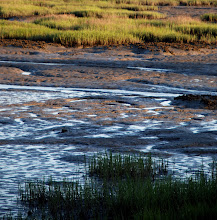I really have considered living by all those important sayings and song lyrics of the late Sixties, but I also believe in "Forgive them that hate you," "Do unto others as you would have them do unto you," and "Love thy neighbor as thyself."
I don’t believe in "the Golden Rule: ‘Gold rules,’" or "Life isn’t fair," or "Greed is good," or "Never give a sucker an even break."
Now, though, is the time to act locally, because we can grow the best-tasting tomatoes known to humankind, Rutgers; we can bake the best bread in the country using natural and healthful ingredients, as the French and Germans and Norwegians do; and we can encourage the industry that made a number of the prominent families in Beaufort prominent: truck farming.
I was just in Northumbria, northernmost England, a few weeks ago, and, in the little hamlet where I stayed, [name withheld because I don’t want any other tourists there], there was an active contest to grow the biggest and best potato and the biggest and best leek. Hell, the contestants had little water tubes leading down to the roots of each leek, and they all dug around in river soil deposited thousands of years ago to find the greatest fertility for the beds of leeks or potatoes. Towns sponsored the "Best leek [or potato] grown in five-gallon buckets using your soil" contest, and posters were up at post offices and tea rooms in larger towns. There was pride in those home-grown leeks and potatoes.

Prize leeks protected by corrugated steel
Widows living in seventeenth-century Northumbrian slate-roofed houses all were growing vegetables in the side or rear yards (the front is reserved for an abundance of flowers). You could see the pride in the straightness of the rows and the healthiness of the leeks or lettuce or beets.
I kept thinking, "We should be doing that in Beaufort." It would be one way to win the war over using oil to bring us shrimp from Patagonia or coffee from Colombia. We may not be able to grow coffee in Beaufort, but we can grow shrimp. And we can certainly grow tomatoes, strawberries, watermelons, squash, and collards.

The front garden of a Northumbrian cottage
We don’t have to let the @#$%^*&%$# get us down: we can ride a bicycle to the farmers’ market and buy local chantarelle mushrooms, local gumbo, or local watermelons. We could even put the produce in a back-pack to save a plastic or a paper bag. We can save our cars for really important or urgent transportation, and, when we use them, we can do it as part of a carpool. There is no good reason to keep driving our SUVs off the sides of the cliff of the world economy like lemmings or crazy competitive sheep. And a study has appeared in the last few weeks that proves that aggressive driving, petal to the metal, is the principal culprit in our waste of gasoline. It is suicidal in more ways than one to speed by someone in a large bully of a vehicle. Practice the real Golden Rule instead.
In an op/ed piece in the New York Times August 5, Bob Herbert wrote that efficiency and conservation are obvious answers to our current explosion in energy cost. And, of course, there are the everyday good energy deeds that would help make a world of difference: car-pooling; taking public transportation when possible; using more efficient lighting; dropping the thermostat a couple of degrees; buying more efficient appliances; unplugging appliances that aren’t in use, and so on.
In addition to living at 77 degrees in the air-conditioning, as they are now doing at the U.N. building, we can do all that Bob Herbert suggests and more. We can compost our waste vegetable matter, fruit peelings and coffee grounds, in the back yard and use the decayed compost around fruit trees. If we have to have irrigation to keep our grass green, at least we can use part of that water to make vegetables and herbs grow. We can reuse plastic bottles by putting tap water in them and pretending that the water is from Perrier or Evian. Denmark has done most of this, and Denmark is now energy-independent, as Thomas Friedman describes in the Times.
In addition to bicycling and car-pooling, we can learn to walk again, at a pace that makes it ever so easy to talk to neighbors and make strangers into friends. Our dogs would appreciate that, and, if they do poop, we can, slightly yuckily, save the remains to bury next to a rose bush.
Am I some kind of a nut? Not according to the people of rural Northumbria, who raise their own chickens and grow their own vegetables and herbs, preserving one of the most beautiful regions known to civilized humans. They seem to get along with their neighbors; they provide work for each other to make a living with (I bought a hand-made shepherd’s crook for £45, and I met Angus, who made the stick and then used my money to buy dinner and a lager or two); and, because they are usefully occupied with productive activities like gardening, they seem not to waste much time with hatred or anger at the follies of the human race. At the bed and breakfast where I stayed, the innkeeper, Gareth, had installed solar water-heating panels about ten years ago! And the most competitive sport in rural Northumbria? Growing prize leeks and prize potatoes.


